 MyDogBreeds
MyDogBreeds Wirehaired Pointing Griffon is originated from France but Native American Indian Dog is originated from United States. Wirehaired Pointing Griffon may grow 26 cm / 11 inches higher than Native American Indian Dog. Wirehaired Pointing Griffon may weigh 93 kg / 205 pounds lesser than Native American Indian Dog. Wirehaired Pointing Griffon may live 7 years less than Native American Indian Dog. Both Wirehaired Pointing Griffon and Native American Indian Dog has almost same litter size. Wirehaired Pointing Griffon requires Moderate maintenance. But Native American Indian Dog requires High maintenance
Wirehaired Pointing Griffon is originated from France but Native American Indian Dog is originated from United States. Wirehaired Pointing Griffon may grow 26 cm / 11 inches higher than Native American Indian Dog. Wirehaired Pointing Griffon may weigh 93 kg / 205 pounds lesser than Native American Indian Dog. Wirehaired Pointing Griffon may live 7 years less than Native American Indian Dog. Both Wirehaired Pointing Griffon and Native American Indian Dog has almost same litter size. Wirehaired Pointing Griffon requires Moderate maintenance. But Native American Indian Dog requires High maintenance
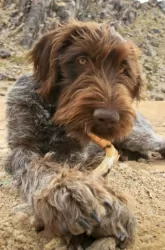 Known also as the Korthals Griffon, the Wirehaired Pointing Griffon is a hunting- and gundog. It was Eduard Karel Korthals who is thought to have brought about this dog breed around 1873.
Known also as the Korthals Griffon, the Wirehaired Pointing Griffon is a hunting- and gundog. It was Eduard Karel Korthals who is thought to have brought about this dog breed around 1873.
He was a Dutchman living in France. It is believed that quite a few dog breeds were used to bring about this dog such as the Otterhound, Spniels, Setters and possibly a Pointer. The dog is known as a supreme gundog and it is a very popular dog breed.
Edward Korthals of Holland was looking for an ideal gun dog. It was in 1888 that the first Griffon Club was formed. It was only in 1916 that this dog was officially recognized as the Wirehaired Pointing Griffon in the United States.
 The Native American Indian Dog is an ancient breed, that some consider to be feral. It is a landrace breed that developed with the indigenous peoples North America. These dogs originally looked and sounded like wolves and it is likely that their ancestry is tied to wolves crossed with pre-Columbian American dogs that came to the America’s with the first peoples. There are some that believe the Native American Indian Dog is a connecting line back to the dogs or wolves that over 12,000 years ago were the first to be domesticated by human beings.
The Native American Indian Dog is an ancient breed, that some consider to be feral. It is a landrace breed that developed with the indigenous peoples North America. These dogs originally looked and sounded like wolves and it is likely that their ancestry is tied to wolves crossed with pre-Columbian American dogs that came to the America’s with the first peoples. There are some that believe the Native American Indian Dog is a connecting line back to the dogs or wolves that over 12,000 years ago were the first to be domesticated by human beings.
They are now a rare breed in the wild and a small group of domesticated dogs. Fossil studies in recent years suggests that the Native American Indian Dogs came to North America about 4500 years after the first indigenous peoples. It is believed that the Native Americans bred the dogs that traders and explorers brought with them to the native coyote as well. This created a breed specific to North America and called the Common Native Dog or the Common Indian Dog. The original NAID was a mix of many different breeds of dogs and wild canines.
Today’s NAID is said to be raised on Indian reservations in the United State and represent a mix of Chinook, Husky, German Shepherd Dog and Malamute, along with perhaps some of today’s wolf mixed in. This dog is raised domestically and is socialized to life with humans. They are the last remaining breed from all the Native North American dogs that lived with the original people of the Americas. They are also thought to have an ancestry similar to the Australian Dingo.
They are a devoted, protective and loyal breed though they tend to be shy. They need to be outside for the majority of the day and don’t do well in crates. They need a fenced yard and room to roam. They are working dogs that hunted, pulled sleds and guarded their homes. They still need a job to so.
Today the North American Indian Dog is being bred to replicate the temperament and appearance of the originals. Although there are many breeders working from the founding breeder with original stock, there are only six that are officially given authorization to breed the NAID. They are registered by Terra Pines with the National Kennel Club but not recognized by the AKC and UKC.
The breed name NAID is trademarked by Karen Markel of Majestic View Kennels in the 1990’s. Today the breed is nationally recognized as a breed very much like the original Native American dogs, The breed is intelligent and quite healthy. They enjoy people and engage in many companion activities.
Whatever its true ancestry the current Native American Indian Dog (NAID), today’s version is not recognized by the AKC, but they are recognized by the Dog Registry of America, the Native American Indian Dog Registry and the National Kennel Club.
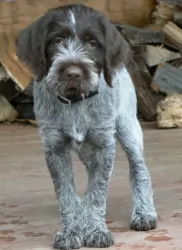 The Wirehaired Pointing Griffon or Korthals Griffon is a medium-to-large sized dog standing at between 50 and 60cm both male and female and weighing between 23and 27kg.
The Wirehaired Pointing Griffon or Korthals Griffon is a medium-to-large sized dog standing at between 50 and 60cm both male and female and weighing between 23and 27kg.
He has a wiry, somewhat harsh curly outer coat and a softer undercoat. The head is quite large. He has thick eyebrows and a beard. The eyes are brown with yellow irises.
This is a low-shedding dog. There are a few colors such as white and brown, white and orange but the coat is also steel gray with brown markings.
These dogs are intelligent and independent with a desire to please their owners. He is able to learn tricks and commands easily. They love their human families and want to be around them all the time.
It would be devastating for such a dog to find himself stuck in the backyard with no human contact. He is also not suited to cramped living conditions in the city but is essentially a country dog, especially since he has boundless energy.
As a family pet, he is playful, friendly, loyal, loving and gentle, behaving well with children and other pets. They’re not aggressive dogs but they make excellent watchdogs, barking if someone comes into their property.
 There are two sizes of the North American Indian Dog – they are medium and large. They have dense short double coats, or they have long top coats and a fairly dense undercoat. They come in a variety of colors mostly black or silver but there is also a tortoiseshell. These tortoiseshell colored dogs are considered by Native Americans to be sacred beings. These tortoiseshell dogs are strikingly good looking and are called Spirit Dog.
There are two sizes of the North American Indian Dog – they are medium and large. They have dense short double coats, or they have long top coats and a fairly dense undercoat. They come in a variety of colors mostly black or silver but there is also a tortoiseshell. These tortoiseshell colored dogs are considered by Native Americans to be sacred beings. These tortoiseshell dogs are strikingly good looking and are called Spirit Dog.
They all have the look of a Siberian Husky or Alaskan Malamute with upright ears and almond shaped eyes that are anywhere from amber to brown with some blue. Usually their tails are down and long but can be curled. They resemble the wolf and have that wild, feral appearance. They can be as large as over one hundred pounds or average seventy to eighty pounds. They are strong, alert and intelligent. They are considered to be hypoallergenic, shedding their coat only once a year.
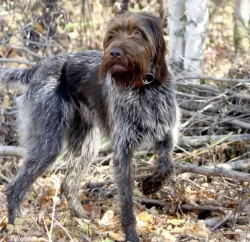 The Wirehaired Pointing Griffon has always been a great hunting dog and he doubles as an excellent pet and companion as well.
The Wirehaired Pointing Griffon has always been a great hunting dog and he doubles as an excellent pet and companion as well.
This dog is extremely loyal to his human family and is friendly, intelligent, loving and affectionate, getting on well with children as well as other pets in the home.
He can reach 14 years of age and doesn’t often get sick, making him an all-round great pet and companion.
 This breed is gentle and loving with children.
This breed is gentle and loving with children.
Endurance, strength and good health.
Low adaptability to small living spaces and lack of outside space; don’t do well in crates and need an experienced dog owner.
They are highly intelligent, love to learn and are just a little stubborn.
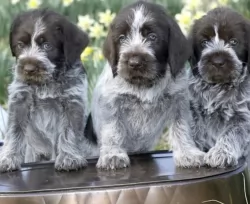 To avoid ear problems, a Wirehaired Pointing Griffon's ears should be kept clean and dry. If you do detect redness inside the ear, it could mean he has an infection that will need to be treated.
To avoid ear problems, a Wirehaired Pointing Griffon's ears should be kept clean and dry. If you do detect redness inside the ear, it could mean he has an infection that will need to be treated.
 This is a fairly healthy, long lived breed having spent so much of its history in isolation. They are prone to some of the issues that affect all medium to large breeds.
This is a fairly healthy, long lived breed having spent so much of its history in isolation. They are prone to some of the issues that affect all medium to large breeds.
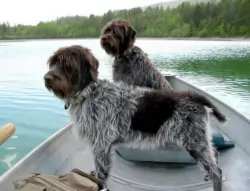 This dog loves his exercise, and if you live in the country so much the better. He will love to go hiking and swimming with you or running next to you as you go cycling. He also loves all kinds of rope- and ball games in the garden. It’s why this active dog isn’t ideal for life in the city.
This dog loves his exercise, and if you live in the country so much the better. He will love to go hiking and swimming with you or running next to you as you go cycling. He also loves all kinds of rope- and ball games in the garden. It’s why this active dog isn’t ideal for life in the city.
Spay or neuter your pet if you don’t want unwanted puppies. Don't do it too early. Speak to your vet about the procedure and about the health benefits that come from spaying and neutering a dog.
These are active dogs and they will require top quality food if they’re to remain healthy and active.
Always check the packaging to see what ingredients are present in your dog’s food. Some of the cheaper, more inferior brands can actually be harmful to your pet with their useless ingredients devoid of vitamins and minerals.
Some home-made food is good and this needs to be plain and free from spicy additives. Dogs have sensitive stomachs and anything unusual can cause them digestive problems.
 Because of their propensity to grow to quickly the puppy should only stay on puppy food for 8-10 months. Feed them a high quality large dog puppy food 3-4 times daily for a total of 2-21/2 cups per day.
Because of their propensity to grow to quickly the puppy should only stay on puppy food for 8-10 months. Feed them a high quality large dog puppy food 3-4 times daily for a total of 2-21/2 cups per day.
Feed a high protein, large dog dry food twice a day for a total of two cups. Do not over feed. Do not feed right before or after exercise do to the risk of bloat.
Healthy, strong long lived dog.
This is not an indoor, couch potato dog. They need exercise and they need space. They won’t do well as apartment dogs unless you can take them to a dog park for over an hour every day. They really need a large fenced in yard. They don’t do well in crates either. He doesn’t understand crates and thinks you are punishing him. They make great hunters, search and rescue dogs, service dogs and therapy dogs. They will succeed at pulling competitions and weight competitions.